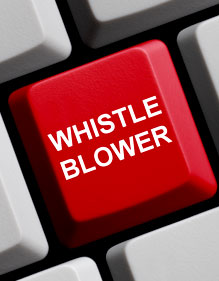
Towards the end of 2014 Corruption Watch (CW) conducted a survey of its reporters, as it has done in 2012 and 2013 too.
The study was commissioned to assess reporters’ understanding of CW’s work, the overall success of CW’s campaigns in South Africa, and reporters’ experiences in reporting an incident. The aim of these CW studies is to assist in improving on factors such as messaging, operational processes and reporting tools and mechanisms, as well as identifying our reporters’ preferred sources of information.
The report was prepared by KLA, using a representative sample of reporters selected by CW.
So who is your typical Corruption Watch reporter? He’s a male (75%) between the ages of 40 and 49 (41 on average), and living in Gauteng (40% live in this province). Our reporter is South African (95%), of African descent (80%), and has a tertiary qualification (claimed by 48%).
He is employed, mostly in the business and public sectors (49% business, 43% public and 6% non-profit). This healthy percentage of government-employed reporters is a strong indicator of the numbers who are not content to stand by while corruption takes place, but are prepared to expose it. Theirs is an act of courage and patriotism.
All in all, though our reporter data shows that there are some characteristics that are seen more than others, our reporters come from all provinces, various sectors of the economy, and from all walks of life, and they range in age from under 20 to over 60. This is what we would like to see even more of in 2015 – so keep those reports coming in!
More details
The results don’t differ much from last year’s results – the proportions of reporters from the various provinces remained mostly constant, as did the figures for gender, level of education and employment status.
After Gauteng, the Free State produced the second-largest group of reporters, followed by KwaZulu-Natal, the Eastern Cape and the North West. KwaZulu-Natal and Free State were second and third respectively in 2013. The Western Cape produced the smallest number of reporters.
It was noted that, while most of our reporters are Africans, there was a decline in the number of African reporters from 93% last year to 80% this year, and an accompanying increase in the number of white reporters (from 6% to 11%) and Indian/Asian reporters (from 1% to 5%). The age breakdown showed more white reporters than last year in the over-60 group, especially.
A majority of our reporters (45%) defined corruption in broad terms, saying that it was something that people did that went against the law, or was unlawful. CW’s definition is more specific – the abuse of resources for personal gain. This ties in with our reporters’ next most favoured definitions of corruption – the abuse or misuse of power, abuse of resources and unjustified enrichment.
“When people get kickbacks“; “Wasting of taxpayers’ money“; “Using public resources for personal gains” – these are some of the comments we received.
In 2013, most reporters defined corruption as the abuse of state resources (32%), as a crime (21%) or an act against the law for personal gain, including fraud (21%).
How did they hear of us? Most heard of CW on the radio, as was the case in 2013. In 2013 this was followed by newspapers and then the internet – in 2014 those two sources switched places. The internet showed significant growth, from 22% to 29%.
The channels they used to report corruption are, in order of prevalence, our call centre, the internet, SMS, e-mail, Mxit, phone, fax and other civil society channels. Most reporters reported to CW because they felt morally obligated to do so (43%) or they thought that CW could help them (36%). In addition, 55% of all reporters had reported their incident elsewhere first. However, clearer, consistent communication by CW that we cannot actively investigate every report, but may use the data in other equally important ways, must remain a high priority.
Overall, reporters are satisfied with the reporting process, with over 80% of reporters agreeing that they are comfortable in the reporting language and that the reporting process was easy and the channel used was quick and easy.
CW’s three most important functions, according to our reporters, are perceived to be:
- exposing corruption constantly in the media;
- engagement with communities of those affected by corruption; and
- releasing of press reports, radio interviews and community discussions around corruption.

